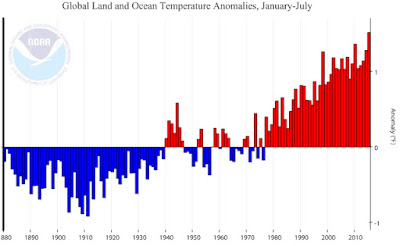25 August 2015, The Guardian, Here’s what happens when you try to replicate climate contrarian papers. A new paper finds common errors among the 3% of climate papers that reject the global warming consensus. Those who reject the 97% expert consensus on human-caused global warmingoften invoke Galileo as an example of when the scientific minority overturned the majority view. In reality, climate contrarians have almost nothing in common with Galileo, whose conclusions were based on empirical scientific evidence, supported by many scientific contemporaries, and persecuted by the religious-political establishment. Nevertheless, there’s a slim chance that the 2–3% minority is correct and the 97% climate consensus is wrong. To evaluate that possibility, a new paper published in the journal of Theoretical and Applied Climatology examines a selection of contrarian climate science research and attempts to replicate their results. The idea is that accurate scientific research should be replicable, and through replication we can also identify any methodological flaws in that research. The study also seeks to answer the question, why do these contrarian papers come to a different conclusion than 97% of the climate science literature? Read More here
Yearly Archives: 2015
25 August 2015, The Conversation, Time for the ‘green tape’ debate to mature: jobs and the environment are not implacable foes. The highly charged debate over the proposed Carmichael coal mine, which culminated in Attorney-General George Brandis’s decision last week to propose winding back environmental legal protections, has exposed the simmering tension between “jobs” and “the environment” on Australia’s political landscape. On one hand, those seeking to invest in the development of Australia’s natural resources and jobs growth have been making a clear case that Australia’s system of assessment and approval for major projects is riddled with procedural uncertainty. On the other, environmental advocates and local communities feel that the current system does not adequately protect the environment – correctly pointing out Australia’s less than stellar record in preventing species from going extinct. As a nation, however, we need to lift our game on both fronts. Investors in the Australian economy and those seeking jobs and growth need certainty with regard to where and how they invest. Equally, to avoid warfare (or “lawfare”) on a project-by-project basis, Australia’s environmental advocates and local communities need certainty too. They need clarity about where and how economic development can occur without harming our environmental heritage. Read More here
24 August 2015, Climate Code Red, As 2015 smashes temperature records, it’s hotter than you think. There is an El Nino in full swing which helps push average global temperatures higher, and records are being broken, but just how hot is it? For several years, we have heard that global warming has pushed temperatures higher by around 0.8 to 0.85 degrees Celsius (°C). But in 2015, that number is not even close. Even before this year’s strong El Nino developed, 2015 was a hot year. The first few months of the year broken records for the hottest corresponding period in previous years all the way back to the start of the instrumental record in 1880. Each month, new records fell.
With the July data in, the US Government’s National Oceanic and Atmospheric Administration reported that July was the hottest month among the 1627 months on record since 1880, and the first seven months of the year was the hottest January-July on record: The July average temperature across global land and ocean surfaces was 0.81°C above the 20th century average. As July is climatologically the warmest month for the year, this was also the all-time highest monthly temperature in the 1880-2015 record, at 16.61°C, surpassing the previous record set in 1998 by 0.08°C. The July globally-averaged sea surface temperature was 0.75°C above the 20th century average. This was the highest temperature for any month in the 1880-2015 record, surpassing the previous record set in July 2014 by 0.07°C. The global value was driven by record warmth across large expanses of the Pacific and Indian Oceans. The year-to-date temperature combined across global land and ocean surfaces was 0.85°C above the 20th century average. This was the highest for January-July in the 1880-2015 record, surpassing the previous record set in 2010 by 0.09°C. As 2015 smashes temperature records, it’s hotter than you think. Read More here
23 August 2015, Climate News Network, Too warm, too few fish: Health warning for world’s oceans. Rampant overfishing combined with the impact of climate change is seriously endangering the wellbeing of the oceans, environmental analysts say. The world’s oceans – covering nearly two-thirds of the Earth’s surface, and on which much of human life depends – are under severe pressure, a report says. Over-fishing has dramatically reduced fish stocks. The thousands of tonnes of rubbish dumped in the oceans wreak havoc on marine life, while climate change is warming and acidifying them, putting them under further stress. These are the sobering conclusions of a wide-ranging study of the Earth’s ecosystems by theWorldwatch Institute, a US-based organisation widely rated as one of the world’s foremost environmental think-tanks. “Our sense of the ocean’s power and omnipotence – combined with scientific ignorance – contributed to an assumption that nothing we did could ever possibly impact it”, says Katie Auth, a researcher at Worldwatch and one of the authors of the report. “Over the years, scientists and environmental leaders have worked tirelessly to demonstrate and communicate the fallacy of such arrogance.” Read More here

